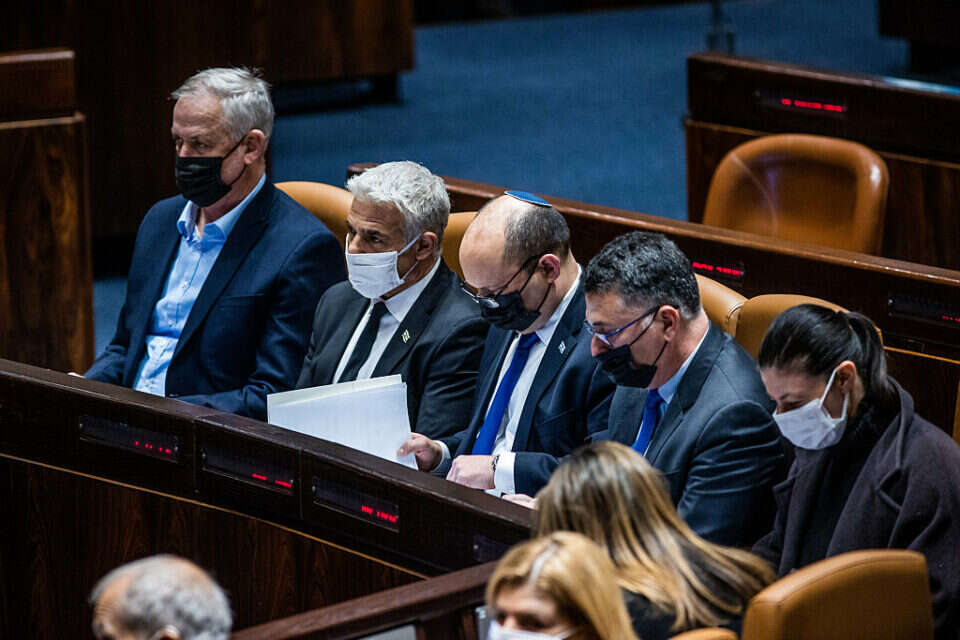From the moment the polls closed, the 24th Knesset knew many storms - especially among coalition members.
The white night of moving the budget to 2022 was quite exhausting.
After a delay of hours and a re-discussion in the Finance Committee, the budget was approved in the morning of November 5, 2021, with the support of 59 MKs against 56 opponents.
36th Government Launches: Knesset Plenum Votes for Formation of Bennett-Lapid Government // Photo: Knesset Channel
That night is remembered mainly following the voting error of MK Moati, who came up for the coalition in lengthy discussions in the Finance Committee, as well as in sweets and cakes distributed among the MKs to maintain the level of vigilance in the votes.
After the transfer of the budget, the chairman of RAAM tweeted that this was "the first time that an Arab party has taken a major part in the transfer of a budget. This is an important step in political integration."
Bennett with Mansour Abbas during budget approval, Photo: Oren Ben Hakon
The budget did pass, but then another controversy erupted within the coalition itself.
On February 28, the "Pension Law," which means allocating one and a half billion shekels to increase pensions to permanent IDF personnel, was passed on first reading. Because the passage of the law is important for the security of the state, finally, the law was approved on first reading by a majority of 57 to 56.
Offsets and rejections
Earlier this month, one of the coalition's flagship laws, the Prime Minister's Restriction Act, did not go up for final approval in the plenum because of an exercise by the opposition.
The debate on the law lasted more than 13 hours due to reservations submitted by the opposition, and just before the final vote, MK Malkieli of Shas sought to declare the law's vote to limit the prime minister's term as a "vote of no confidence" in the government.
In doing so, the opposition tried to embarrass the joint list and make it difficult for it to support the law.
Defense Minister Ganz, Photo: Oren Ben Hakon
The coalition ran into trouble because it had to pass the law by a majority of 61 MKs - the size of the current coalition, but Bennett was forced to leave the plenum for a meeting with the German chancellor. A stronghold of religious Zionism fell in Corona, and due to a set-off arrangement with the opposition the law could not be passed by a majority of 61, which forced Saar to postpone the vote until after the Knesset recess in early May.
The coalition is also in turmoil due to the Citizenship Law, which was submitted by Minister Shaked.
The law was passed with the help of a collaboration between Shaked and MK Rotman from the opposition, who also submitted the law.
In protest, Meretz passed about 50,000 reservations to the law to prevent its passage.
The interior minister said that "this is a first-rate Zionist, national and security law that cannot be abandoned solely due to petty politics."
Since the inauguration of the government, opposition MKs have been boycotting Knesset committees.
According to the opposition, the coalition divided the composition of the committees so that it does not reflect the composition of the Knesset factions according to their relative size.
Despite talks between the parties to reach compromises on the issue, the defamation between the parties continued.
In an interview with the "Shishvat" supplement in December, Knesset Speaker Miki Levy was asked what was his biggest low point in his position - and he mentioned the issue of committees. "The opposition fell in love with the opposition, and it did not come to work.
It's convenient for her, "he said.
Levy also referred to the High Court that was filed against him over the division of committees. "The High Court stood by my side. Boycotting the committees is an extreme step, which harms the public interest in the committees.
At a meeting of the Likud faction in October, it was announced that some MKs had called for an end to the boycott, but it continued until the Knesset went into recess.
Were we wrong?
Fixed!
If you found an error in the article, we'll be happy for you to share it with us

